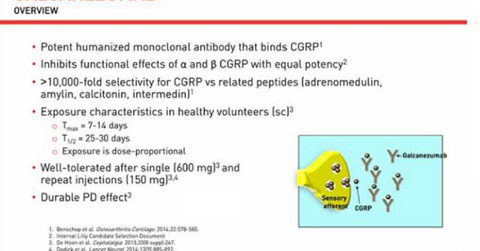This Could Be Eli Lilly’s Long-Term Growth Driver
In September 2017, Eli Lilly announced that a 12-month open-label study showed a positive safety and tolerability profile of Galcanezumab for migraines.
Oct. 16 2017, Updated 10:38 a.m. ET

About Galcanezumab
Galcanezumab is a monoclonal antibody under investigation that was created to fight calcitonin-related polypeptides alpha and beta. Galcanezumab has been developed for the prevention of migraine headaches.
In September 2017, Eli Lilly announced that a 12-month open-label study demonstrated the positive safety and tolerability profile of Galcanezumab in individuals with migraines.
In the 12-month study, patients on Galcanezumab demonstrated a statistically significant decrease in the number of a monthly migraine headache days. Patients on Galcanezumab 120 mg showed reductions in migraine headaches over 5.6 days, while patients on galcanezumab 240 mg showed a reduction over 6.5 days.
Eli Lilly (LLY) has plans to submit a BLA (Biologics License Application) for galcanezumab to the FDA (US Food and Drug Administration) in the 2H17.
Clinical trials
In June 2017, Eli Lilly presented the results from the three phase-3 trials with Galcanezumab. Eli Lilly presented the detailed results of the phase-3 Evolve-1, Evolve-2, and Regain trials. In both the Evolve-1 and Evolve-2 trials, patients on galcanezumab 120 mg and 240 mg doses demonstrated a significant decrease in the average number of monthly migraine headache days compared with patients on placebo therapy.
Evolve-1 trial
In the phase-3 Evolve-1 trial, 60.3% and 60.9% of patients, respectively, on Galcanezumab 120 mg and Galcanezumab 240 mg demonstrated at least 50% reductions in the number of migraine headache days, compared with 38.6% of patients on placebo.
In the Evolve-1 trial, 38.8% and 38.5% of patients, respectively, on Galcanezumab 120 mg and Galcanezumab 240 mg demonstrated at least 75% reductions in the number of migraine headache days, compared with 19.3% of patients receiving placebo treatment. In the same trial, 15.6% and 14.6% of patients on Galcanezumab 120 mg and 240 mg, respectively, showed 100% reductions in migraine headache days, compared with 6.2% of patients on placebo treatment.
Evolve-2 trial
In the phase-3 Evolve-2 trial, 59.3% and 56.5% of patients, respectively, on Galcanezumab 120 mg and Galcanezumab 240 mg demonstrated at least 50% reductions in the number of migraine headache days, compared with 36.0% of patients on placebo.
In the same trial, 33.5% and 34.3% of patients on galcanezumab 120 mg and galcanezumab 240 mg, respectively, demonstrated at least 75% reductions in the number of migraine headache days, compared with 17.8% of patients on placebo. Also, 11.5% and 13.8% of patients on Galcanezumab 120 mg and Galcanezumab 240 mg, respectively, showed 100% reductions in migraine headache days, compared with 5.7% of patients on placebo.
The Regain trial
In the phase-3 Regain trial, 27.6% and 27.5% of patients on Galcanezumab 120 mg and Galcanezumab 240 mg, respectively, achieved 50% reductions in the number of migraine headache days, compared with 15.4% of patients on placebo therapy.
This clinical trial data is expected to favor Eli Lilly in gaining regulatory approval around the world and build a strong commercialization capability. Eli Lilly’s peers in migraine drug market include Merck (MRK), Allergan (AGN), Bristol-Myers Squibb (BMY), and Amgen. Notably, the Vanguard Total Stock Market ETF (VTI) invests ~0.33% of its total portfolio holdings in LLY.
